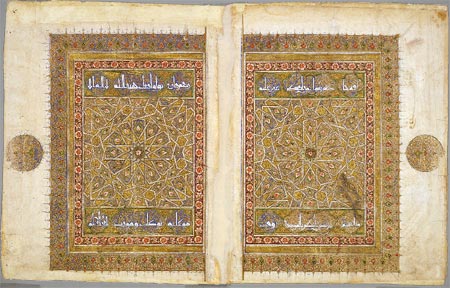…the Arabs burst out of their homeland to set their stamp upon the world…
Their eruption was one of the most astonishing events of history. In A.D. 622 Mohammed and his disciples emigrated from Mecca to Medina, about 270 miles to the north, where they established the first of the Islamic governments and thus initiated the Moslem epoch: Moslems still date their years, which are shorter than Christian years, from the year of the Hegira ( A.D. 1971 is A.H. 1391). The Arabs were then a people almost entirely isolated from the world, poor, mostly illiterate, and fearfully ignorant. Yet little more than a century later so explosive was the inspiration of Islam that the armies of the Arabs not only controlled the entire southern Mediterranean shore but had marched eastward to the Indus, westward to the Atlantic, northward to the steppes of Central Asia, and had stormed Europe to make Islamic provinces of Spain and Sicily. There was a time when even the pope paid them tribute.

—Mohammed’s birth. Miniature illustration on vellum from the book Jami’ al-Tawarikh (literally “Compendium of Chronicles” but often referred to as The Universal History or History of the World), by Rashid al-Din, published in Tabriz, Persia, 1307 A.D. Now in the collection of the Edinburgh University Library, Scotland.—Read More:http://www.create-answer.com/muhamad%20ENG/1.htm
So the Arabs became a Great Power, but already their success was complex and contradictory. The distinction between Church and State was unclear from the beginning: in Mohammed’s own mind there was no distinction. This made a curious basis for imperial expansion. The Islamic empire began as a religious movement, it being the duty of Moslems to spread the word among the infidels, but its noblest characteristic turned out to be tolerance. Millions of its new subjects accepted the Islamic faith, but, at least for Jews and Christians, there was no compulsion to do so, and the conquerors proved to be unexpectedly adaptive and assimilative.

—There are few books sacred enough to be never turned into a digital edition and be treasured the way they are forever, and this 14th-century Qur’an written entirely in large, gold script interspersed with fascinating illumination is clearly one of them. The Islamic book commissioned by Sultan Baybar’s II in 1304, during the Mamluk Sultanate, in Cairo, is now housed in The British Library in London and is considered one of the world’s great manuscript treasures. But, this sacred book is now up for the religious souls who can afford to pay $90,233 for all seven volumes. Facsimile Editions, the British company, is producing the edition as a private venture.—Read More:http://www.bornrich.com/entry/a-14th-century-quran-only-oil-rich-sheiks-can-buy-to-mitt-out-their-environmental-sins/
Newly escaped from the Ignorance, the Arabs were eager learners. They respectfully absorbed the scholarship and experience of the conquered civilizations- in the east the civilization of the Persians, in the west the dying Greco-Roman civilization. They became the entrepreneurs of knowledge, between the vanished world of the classical ancients and the new world of the Renaissance that was to come; for a time when Christian Europe was hamstrung by dogma, Moslems were generally free to make what intellectual explorations they would.

—The resignation of Arab Bank chairman Abed Hamid Shoman will have negative repercussions for the finance institution, Palestinian economists said on Friday.
The Shoman family, originally from Beit Hanina near Jerusalem, have been the corner stone of the Arab Bank since its founding over 80 years ago, economist Nasser Abdel Karim told Ma’an.
The former chairman, who resigned on Thursday, is the grandson of the Arab Bank’s founder.
“The market has been negatively affected as the Arab Bank share price dropped nearly 4 percent on Thursday, but only after the Eid al-Fitr holidays will the negative effect will be clear,” he added.
Shareholder and prominent Palestinian businessman Munib al-Masri played down the departure of Shuman, while noting his wife, daughter and the secretary of the board of directors had also resigned.
Shoman only retained around 2 percent stake in the bank, and his departure will actually boost the company’s fortunes, al-Masri said. —Read More:http://www.maannews.net/eng/ViewDetails.aspx?ID=513177 image:http://www.asia.si.edu/exhibitions/online/islamic/figural1b.htm
With extraordinary speed the Arabs familiarized themselves with the whole known world. They became great travelers and sailors. Arab merchants were to be found in China, in Russia, and in many parts of Western Europe; there are still Arabic words in the Icelandic language, and the earliest known Swedish currency was based upon an Arab measure of weight. Everywhere they picked up skills,styles and ideas. They produced a succession of celebrated mathematicians, astronomers, physicians, architects, and historians, and in the centers of their learning- in southern Spain, in Egypt, in North Africa- they achieved a splendid synthesis of Eastern and Western, classic and contemporary culture.





 COMMENTS
COMMENTS